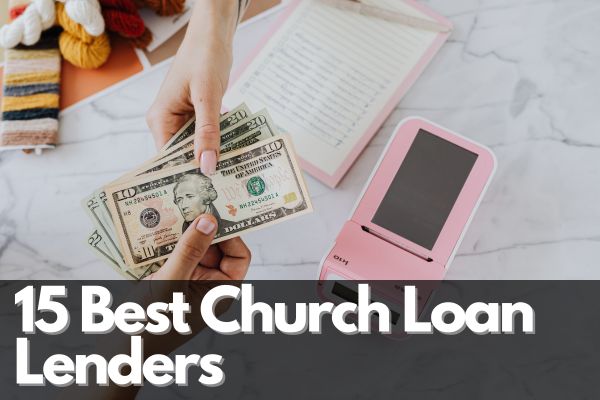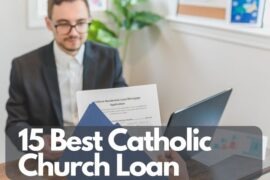Financing a church can be challenging, particularly when securing construction, renovation, or debt refinancing loans.
However, many lenders specialize in providing loans for churches, offering a range of financing options and services designed specifically for religious organizations.
With so many lenders, it can be difficult to know where to start. In this context, this article will provide an overview of the 15 best church loan lenders and briefly describe how they operate.
Whether you’re looking to build a new church, renovate an existing one, or refinance debt, this guide will help you find the right lender to meet your church’s financial needs.
Contents
15 Best Church Loan Lenders
1. The United Methodist Church Extension Loan Fund
This lender provides property purchase, construction, renovation, and debt refinancing loans. They offer fixed-rate loans with terms of up to 30 years.
2. The Lutheran Church Extension Fund
This lender offers loans for Lutheran churches’ building, renovation, and refinancing projects. They also provide investments and endowment management services.
3. The Catholic Finance Corporation
This lender provides loans for church building, renovation, refinancing, and equipment financing. They also offer investment and endowment management services.
4. The Christian Community Credit Union
This lender provides loans for church building, renovation, and refinancing, as well as equipment financing and lines of credit. They also offer checking and savings accounts and other financial services.
5. The Church Development Fund
This lender offers loans for church construction and renovation and funding for land purchases and debt refinancing. They also provide investment services and financial planning resources.
6. The Christian Investors Financial
This lender provides loans for church construction, renovation, and refinancing, as well as equipment financing and lines of credit. They also offer investment and financial planning services.
7. The Christian Community Foundation
This lender offers loans for church building and renovation and funding for land purchases and debt refinancing. They also provide charitable giving and donor-advised funds services.
8. The Church Loan Specialists
This lender specializes in providing loans for churches and offers a range of financing options for property purchases, construction, and renovation. They also provide financial planning and consulting services.
9. The Griffin Capital Funding
This lender provides loans for church construction, renovation, and refinancing, equipment financing and lines of credit. They also offer investment and financial planning services.
10. The Evangelical Christian Credit Union
This lender offers loans for church building, renovation, and refinancing, as well as equipment financing and lines of credit. They also provide other financial services, such as checking and savings accounts.
11. The Bancorp Bank
This lender provides loans for church construction, renovation, and refinancing, as well as equipment financing and lines of credit. They also offer other banking services, such as checking and savings accounts.
12. The Evangelical Covenant Church Loan Fund
This lender offers loans for church building, renovation, refinancing, and equipment financing. They also provide investment and financial planning services.
13. The National Cooperative Bank
This lender provides loans for church construction, renovation, and refinancing, as well as equipment financing and lines of credit. They also offer other banking services, such as checking and savings accounts.
14. The Presbyterian Investment and Loan Program
This lender offers loans for Presbyterian churches for building, renovation, and refinancing projects. They also provide investment and financial planning services.
15. The American Church Mortgage Company
This lender provides loans for church construction, renovation, and refinancing, as well as equipment financing and lines of credit. They also offer investment and financial planning services.
These lenders provide loans specifically designed for churches and other religious organizations. They offer various financing options, including fixed-rate loans, equipment financing, and lines of credit.
Many also provide investment and financial planning services to help churches manage their finances and investments.
How To Research And Choose A Lender
Researching and choosing a lender for a church loan can be a daunting task, but here are some steps that can simplify the process:
1. Determine The Type Of Loan Needed
Before researching lenders, it’s important to know the type of loan needed, whether it’s for church construction, renovation, or debt refinancing.
2. Seek Recommendations
Ask for recommendations from other churches, denominational headquarters, and financial professionals who specialize in church financing.
3. Check Online Resources
Search for church lenders online and read reviews and ratings from previous customers.
4. Evaluate Lender’s Reputation And Track Record
Look for a lender with a strong reputation and a track record of providing loans to churches.
5. Check Eligibility Requirements
Review the lender’s eligibility requirements to determine if the church meets the criteria for a loan.
6. Evaluate Loan Terms And Conditions
Review the lender’s loan terms and conditions, including interest rates, repayment terms, and any fees associated with the loan.
7. Consider Customer Service
Evaluate the lender’s customer service, including responsiveness and willingness to answer questions.
8. Compare Lenders
After researching and evaluating multiple lenders, compare their loan terms, conditions, and interest rates to find the one that best fits the church’s needs and financial situation.
9. Seek Professional Advice
Consider consulting with a financial professional, such as a CPA or financial advisor, to help evaluate loan options and choose the best lender for the church.
By following these steps, churches can research and choose a lender offering the best financing options for their needs.
Steps To Check Your Eligibility For A Church Loan
1. Understand The Lender’s Eligibility Requirements
The first step in checking your church loan eligibility is understanding the lender’s requirements. Each lender may have different eligibility criteria, such as minimum credit score, church size, years in operation, and financial stability.
Reviewing the lender’s website or contacting them directly to understand their eligibility requirements is important.
2. Gather Financial Documentation
Before applying for a loan, you must gather financial documentation demonstrating your church’s financial stability and ability to repay the loan.
This may include financial statements, tax returns, bank statements, and other financial records.
3. Assess Your Church’s Financial Health
You should assess your church’s financial health to determine if it is in a position to take on debt.
This includes analyzing your cash flow, debt-to-income ratio, and other financial metrics to determine if you can afford the loan payments.
4. Apply For Pre-approval
Some lenders may offer pre-approval, which allows you to determine your eligibility for a loan before submitting a full application.
Pre-approval may involve providing the lender with basic financial information and documentation for review.
5. Submit A Full Loan Application
If you meet the lender’s eligibility criteria and are pre-approved for a loan, you can then submit a full loan application.
This may involve providing additional financial documentation and information, such as a detailed project plan, cost estimates, and collateral information.
By following these steps, you can assess your church’s eligibility for a loan and determine which lenders may be a good fit for your financing needs.
It is important to carefully review the terms and conditions of any loan offer and work with a lender with experience working with churches and religious organizations.
Steps On How To Apply For The Loan
Here are the general steps to apply for a church loan:
1. Determine Your Financing Needs
The first step in applying for a church loan is determining your financing needs.
This may include identifying the type of loan you need, such as construction, renovation, or debt refinancing, and determining the amount of funding you require.
2. Research Lenders
Once you know your financing needs, you should research potential lenders specializing in lending to churches. This may involve reviewing their eligibility criteria, interest rates, fees, and terms and conditions.
3. Gather The Required Documents
Before applying for a loan, you must gather the required documentation, including financial statements, tax returns, bank statements, and other financial records.
Reviewing the lender’s application requirements and gathering all necessary documents in advance is important.
4. Complete The Loan Application
Once you have identified a lender and gathered the required documentation, you can begin the loan application process.
This may involve completing an online application or submitting a paper application.
5. Provide Additional Information
After submitting the loan application, the lender may request additional information or documentation to support your loan request.
This may include a detailed project plan, cost estimates, and collateral information.
6. Review Loan Offer
If your loan application is approved, the lender will provide a loan offer that outlines the loan terms, interest rate, fees, and repayment schedule.
It is important to review the loan offer carefully and ask questions before accepting the loan.
7. Close The Loan
Once you accept the loan offer, you must complete the loan closing process. This may involve signing loan documents, providing additional information, and paying closing costs or fees.
Following these steps, you can apply for a church loan and secure the financing you need to build, renovate, or refinance your church. It is important to work with a lender with experience working with churches and religious organizations and to carefully review all loan terms and conditions before accepting an offer.
Conclusion
Securing financing for a church can be a complex process, but many lenders specialize in providing loans to religious organizations.
By researching potential lenders, understanding their eligibility criteria and application requirements, and gathering the necessary documentation, you can increase your chances of securing a loan that meets your church’s financial needs.
When applying for a loan, reviewing all loan terms and conditions carefully and working with a lender with experience working with churches and religious organizations is important.
By following these steps, you can secure the financing you need to build, renovate, or refinance your church and continue to serve your community for years to come.






